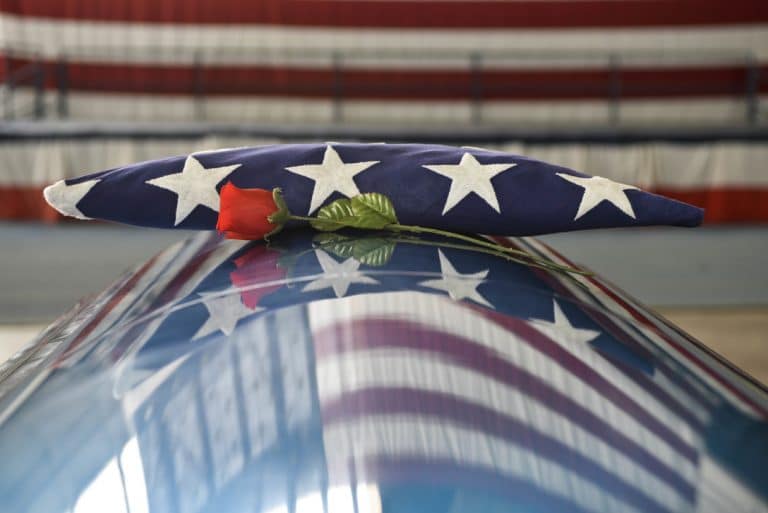
Robert Muthersbaugh was, according to his relatives, a “riot” and a “spark plug.”
He was a favorite uncle. He was a salesman. And he was someone who, after losing his driver’s license, made a point of passing the test to get it back at age 99.
But it wasn’t until late in his life that his relatives realized there was something much deeper to Muthersbaugh than the jokes he told at family gatherings: Muthersbaugh, a Hamden resident who died this month at 101, was a decorated World War II veteran.
“I never heard him talk about the war until just recently, when the people from the Czech Republic contacted him,” said Jeffry Muthersbaugh, Robert Muthersbaugh’s nephew. “My father said that, you know, (he) was in the war, he was in the Army, and he wound up getting TB, but that was all I knew. … I had no idea the medals that he had and things that he did.”
The late Muthersbaugh began sharing his memories with family and friends after he met a Czech doctor and learned that the Czech city of Pilsen holds an annual festival to celebrate its 1945 liberation.
Muthersbaugh was a radio operator in Gen. George S. Patton’s Third Army when American troops marched on Pilsen in 1945, freeing it from German occupation.
But because he wound up in the hospital with tuberculosis shortly thereafter, he was separated from his outfit and did not learn about the Pilsen celebrations until decades later, Muthersbaugh told the New Haven Register in 2021.
Once the Czech government learned about Muthersbaugh and his role in the liberation, officials made sure to honor him: in late 2021, two Czech defense attaches visited Muthersbaugh’s home and presented him with a medal.
It was one of many he received for his three-and-a-half years of service with Patton’s army, according to his obituary.
“I always thought he was a very special guy, but … there was just more to it that just ‘funny Uncle Buck,'” Jeffry Muthersbaugh said, referring to Muthersbaugh by his nickname. “He was a genuine war hero.”
After reaching Pilsen, Patton’s army was stopped from continuing east through Czechoslovakia, according to Marc Wortman, an independent journalist and historian based in New Haven, and author of the book “1941: Fighting the Shadow War.”
“What happened in Czechoslovakia was basically the same thing that happened throughout eastern Europe,” Wortman said. “The decision was made— and it was a political decision — that U.S. forces that could have easily gone all the way to Prague stopped, because basically the Yalta agreement among Stalin, Churchill and Roosevelt gave the Soviet Union future control of the zones that they liberated in the east.”
Once the Allied forces reached Pilsen, Czech resistance fighters rose up against the Germans, according to Wortman, who said the Soviets then “basically stood back and let the resistance forces fight it out with much better armed German SS forces.”
“In some ways … it’s a tragic story,” Wortman said. But, “the U.S, forces were truly brave and got to where they got, and nothing should be taken away from (that). … Liberating a well-defended land is an incredible military feat.”
As the years go by, the numbers of those who still remember the liberation is rapidly diminishing.
Sixteen million Americans served in World War II, according to the website for the National World War II Museum of New Orleans. Last year, just 167,284 of those veterans were still alive, with 2,810 of them living in Connecticut, the website says.
About 180 World War II veterans die each day, per the museum, which projects barely 1,000 will still be alive in 2034.
“It’s so sad. It really is. I mean, everybody says ‘the Greatest Generation,’ but they really were, if you think of what these people did,” said Jeffry Muthersbaugh, who happens to be a World War II buff. “All of these soldiers and sailors were mobilized and sent all over the world to fight for democracy.”
Two generations ago it would have been uncommon for Americans not to regularly interact with those who served in World War II.
But for today’s teenagers, it is more rare.
Eighteen-year-old Jimmy Muthersbaugh said his great uncle, Robert Muthersbaugh, was the only World War II veteran he ever met.
“It really is just an honor (to have met him),” Jimmy Muthersbaugh said. “It was really special talking to him.”
Jimmy Muthersbaugh, who recently graduated from Bethel High School, participated in the Junior Reserve Officer Training Corps. At the end of the year, the JROTC held its annual military ball with Robert Muthersbaugh there as an honored guest.
“Throughout the night there were so many people that came up to not only him but to me to, to just talk about it, and it really made me appreciate what he did even more,” Jimmy Muthersbaugh said.
As the oldest veteran in attendance, Robert Muthersbaugh got to cut the cake, according to Jeffry Muthersbaugh, who said the event was a real highlight for the 101-year-old.
Robert Muthersbaugh had hoped to outlive his own uncle, Jeffry Muthersbaugh said. He came close.
“He said he wanted to live to 103,” Jeffry Muthersbaugh said. “His uncle lived to 103, so he said he wanted to beat his uncle by a day.”
Robert Muthersbaugh was just 15 months shy of that goal when he died July 6. But he was in remarkable shape for his age, living on his own until the very end, his nephew said.
“He was really a riot, and he had his faculties right until the end,” Jeffry Muthersbaugh said. “He really was my favorite uncle. … He was just a spark plug, he was a lot of fun and he was always laughing. Always telling jokes.
“It wasn’t a true party if Uncle Buck wasn’t there.”
___
(c) 2023 the New Haven Register
Distributed by Tribune Content Agency, LLC.
0 comments :
Post a Comment